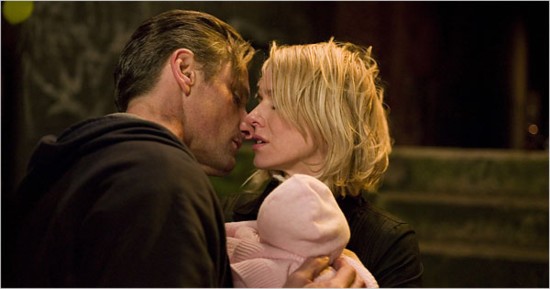

Reviews of Recent Independent, Foreign, & Documentary Films in Theaters and DVD/Home Video
Directed by David Cronenberg. Produced by Paul Webster & Robert Lantos. Written by Steven Knight. Director of Photography: Peter Suschitzky. Edited by Ronald Sanders. Music by Howard Shore. Released by: Focus Features. Country of Origin: UK/Canada. 100 min. Rated R. With: Viggo Mortensen, Naomi Watts, Vincent Cassel, Sinéad Cusack, Jerzy Skolimowski & Armin Mueller-Stahl.
Naomi Watts plays Anna, a half-Russian midwife, who, one night, has to attend to an emergency birth in which a 14-year-old Russian girl dies on the spot. The baby lives. The teenager had a diary, and in it, detailed in Russian, are the desperate cries of a girl enveloped in London’s underground mob, which involves the disquietingly sinister boss Semyon (Armin Mueller-Stahl) and his volatile, homophobic son Kirill (Vincent Cassel). Anna confronts Semyon (as the book contains, after all, the address of the restaurant/base for Semyon) to see if he might be able to help her find the baby’s relatives and to translate the diary. Before he comes back to her with his translation of the text, Anna’s Russian mother (Sinéad Cusack) and uncle (Jerzy Skolimowski) become very concerned after translating some of it themselves. Along with this, we’re privy to the testy and ultimately dangerously close bond between and Kirill and his driver, Nikolai (Viggo Mortensen). So close, in fact, that Kirill watches Nikolai have sex with a prostitute to prove to himself that Nikolai “ain’t queer” (Kirill has more than a small problem with his masculinity and what his sexual persuasion might be). Nikolai is looked upon like the good son by Semyon, who realizes his own flesh and blood is corrupt with an unhinged temper, which also adds to Kirill’s frustration of being looked down upon as the boss’s son. Truth be told, Steven Knight’s screenplay may be a tinge tamer than Cronenberg die-hards might be used to. Yet it shouldn’t be shortchanged, as it’s a strong screenplay for characterizations, plot, and even a denouement that may at first seem to be a disappointment. The characters are all so vivid that the actors can’t play them any other way. Watts shines even when having little more to do than to look worried; Mortensen continues his collaboration with Cronenberg from History with a performance that’s even better, if one can believe that, with subtlety so convincing you can’t tell who’s who, at times, underneath those sun glasses; as a man riddled with so much insecurities that they spill over when he least expects it, Cassel is perfectly horrific as Kirill; and Mueller-Stahl, in maybe the best performance of the four main players, nails Semyon as a man who is all the more dangerous because of his calm nature. He only hints, with small glances, at the maliciousness of his true self.
Fear not all you fanboys looking for the visceral spirit that catapulted people from their seats during The Fly and Videodrome.
Cronenberg still has it in him, even in an age of desensitization, to shock the hell out of a harden viewer such as myself. As any director dealing
with the ugly nature of violence in everyday life and in organized crime, Cronenberg uses quick flashes of violence (throat slittings) for
shock value. As for the much hyped steam room fight sequence, that too lives up to the buzz like no other such scene since Old Boy. It fits
into place as the typical climax (if typical involves a naked Mortensen fighting off two nasty gangsters) gives way to an emotional one and a
final
shot so haunting one would swear it echoes The Godfather.
Jack Gattanella
|